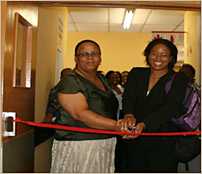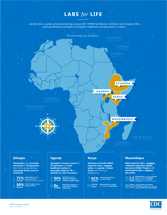Building to Last: CDC Partner Leaves Proud Legacy in South Africa

Ms.Nomalanga Makwedini (Eastern Cape Department of Health) and Dr. Pamela Marks (CDC), left to right, officially open a newly renovated health facility.
On a sweltering February day in East London (affectionately known as Buffalo City) in the Eastern Cape province of South Africa, representatives from the regional South African government joined with partners supporting the U.S. President’s Emergency Plan for AIDS Relief (PEPFAR) to celebrate eight years of dedicated public health support to expand quality HIV/AIDS care and treatment services in the region.
The group had gathered to commemorate the achievements led by Columbia University’s ICAP in South Africa. ICAP’s activities were funded by PEPFAR through the U.S. Centers for Disease Control and Prevention (CDC). The ending of the cooperative agreement between CDC and ICAP on February 22 marked the beginning of program sustainability under the South African government and local partners.
The strong relationship among CDC, ICAP, and the Eastern Cape Department of Health began in 2003 with CDC providing support through President Clinton’s LIFE Initiative, and was quickly followed by CDC/PEPFAR funding in 2004. “We started this HIV program together. There were so many fires to put out and lots of gaps”, said Ms. Nomalanga Makwedini, Deputy Director General, Eastern Cape Department of Health. “ICAP came in at the right time, when we started providing antiretroviral drugs in 2003. As a province we did not have the knowledge. We were fortunate that CDC funded you, and you could help,” she continued.
Working together to ensure success
With the launch of PEPFAR, there was a rush to provide emergency care and treatment to underserved populations, and established international organizations were enlisted to help with the scale-up. ICAP was one of four such “Track 1” program partners recruited to jump-start programs in South Africa. Today all these programs are transitioning their services to local governments – and all, like ICAP, have left solid foundations on which the South African facilities can build and grow. As Dr. Pamela Marks from CDC commented, “It is only with the monumental contribution of partners like ICAP that South Africa has reached this point in the HIV epidemic.”
ICAP’s program was a phenomenal success at providing life-saving care and treatment to thousands of adults and children living with HIV, primarily because the organization always walked step-in-step with the South African government. Together, ICAP and the province identified problems and implemented solutions. “It has been a wonderful and fruitful partnership working with the Eastern Cape. Our roots in South Africa are right here and we feel very privileged to have worked here,” said Dr. Wafaa El-Sadr, ICAP global director.
ICAP’s program was a phenomenal success at providing
life-saving care and treatment to thousands of adults and children
living with HIV, primarily because the organization always walked
step-in-step with the South African government.
Transitioning programs to local leadership
ICAP cemented their legacy in the Eastern Cape by officially handing over five newly renovated clinics to the government. The facilities are in Mdantsane, reputed to be the second largest township in South Africa after Soweto. Since the program’s inception, ICAP has helped nearly 100,000 adults and almost 8,000 children start antiretroviral therapy. In addition, ICAP started strengthening the health system early on by developing reporting and monitoring systems, providing skilled staff, and training and mentoring existing staff. These programs will be handed over to two local district support partners, Health Systems Trust and Aurum Research Foundation.
New projects, expanded opportunities
And as one chapter closes, another opens. With CDC funding, ICAP will continue to strengthen facilities in the O.R. Tambo district in the Eastern Cape. CDC has also funded ICAP to lead several evaluations in South Africa, including one on pediatric HIV treatment and another on populations at higher risk of HIV infection. In addition, ICAP will conduct a multi-country study on medical male circumcision in several southern African countries. Finally, in collaboration with the University of Cape Town, ICAP will investigate and develop TB/HIV training courses for clinicians and infection control diplomas for clinic staff.
Ms. Sindisa Gede, Acting District Manager for Amatole, concluded the day’s commemorations, saying “The footprints of ICAP will never fade from our hearts. ICAP has done their part in ensuring that things are happening and systems are in place. Now it is for us to ensure that we keep your high standards and carry it forward. Shine, ICAP, shine!”
Labs for Life Infographic:

Get email updates
To receive email updates about this page, enter your email address:
Contact Us:
- Centers for Disease Control and Prevention
1600 Clifton Rd
Atlanta, GA 30333 - 800-CDC-INFO
(800-232-4636)
TTY: (888) 232-6348
24 Hours/Every Day - Contact CDC-INFO
 ShareCompartir
ShareCompartir


